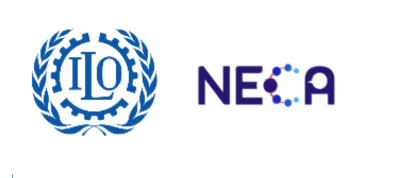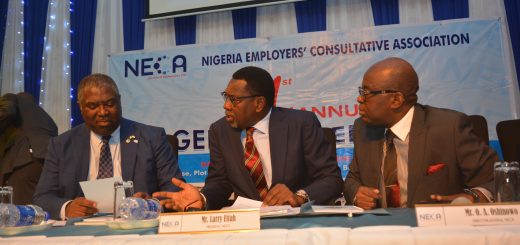NECA and ILO collaborate to eliminate Child Labour in Nigeria
The International Labour Organization (ILO) and the Nigeria Employers’ Consultative Association (NECA) have agreed to collaborate to accelerate progress on the elimination of Child Labour in the Cocoa and Artisanal and Small-Scale Gold Mining (ASGM) supply chains in Nigeria through the Accelerating action for the elimination of child labour in supply chains in Africa” (ACCEL Africa) Project.
The ACCEL Africa project is a 4-year project funded by the Dutch Government; however, implementation in Nigeria is from May 2019 to October 2022.
Applauding the commitment of NECA to fight the scourge of child labour, Dennis Zulu, Director of ILO Country Officer for Nigeria, Ghana, Liberia and Sierra Leone, commended NECA for providing a platform to amplify the elimination of child labour in global supply chains.

He noted that Employers’ organizations such as NECA played a critical role in the fight for the elimination of the Worst Forms of Child Labour by engaging in tripartite discussions on the issue of child labour, providing inputs into legislation and encouraging the implementation of ILO child labour conventions’ principles at national, state and enterprise level.
Furthermore, employers’ organization have been encouraging their members to stop employing child labour and to be more aware of and discourage adverse hiring practices of their suppliers that took advantage of child labour. Mr Zulu further urged NECA to continue to participate in projects with development partners to withdraw child labourers from fields and prevent child labour.

”the challenge of child labour globally has become worrisome and unacceptable to us.
”We are hopeful that through the ACCEL Africa Project we can continue to strengthen NECA’s involvement in all tiers of child labour elimination, as well as NECA’s capacity to effectively eliminate child labour in supply chains in the private sector, ‘’ said Mr Zulu.Child labour elimination is too important to not have employers’ at the forefront, promoting good practice’ he added.
No nation can afford to mortgage its future leaders through unwholesome activities such as child labour. We frown at any work which deprives children of their childhood, their potentials, their dignity and which harmful to their physical and mental development. While poverty and unemployment are major drivers of Child Labour in Nigeria, made worse with the especially with the advent of Covid-19, it is still not an excuse to interfere with their education or expose them to forms of labour suited for adults, he continued.
The NECA Director-General also noted that despite Nigeria’s ratification of the ILO’s Child Labour Convention 138 on the Minimum Age for Admission to Employment , and Convention 182 on the Worst Forms of Child Labour there is still a high prevalence of exploitation in the largely informal Agricultural and Mining sectors.
”Therefore, as a responsible Employers’ Association and the authentic Voice of Business, it is incumbent on us to advocate and create awareness to the actors in the supply chain the benefits of responsible businesses without child labour ”While commending the ILO for providing both technical and financial support throughout the Accel Africa Project, the NECA DG pledged, “the Association will also work with employers and other Stakeholders in the Organized Private Sector to review and develop policies and organizational code of conducts in the private sector to respond to child labour issues. Furthermore, the lessons from this project should serve as a model for replication in other relevant supply chains by NECA” Dr Olawale further averred, “NECA will also support the capacity building and formalization of Associations in the Cocoa and Mining Sectors as Employers’ Associations to ensure the institutionalization of fair labour practices and decent work in line with extant labour laws and ILO Conventions.
”The ILO and NECA have signed an 18 months implementation agreement, ending January 2022, to strengthen the capacities of employers and employers’ organizations in child labour elimination in supply chains in Nigeria towards improving private sector compliance on child labour elimination. Specifically, the designed programme proposes an integrated set of interventions as listed below:
- Support the institutional capacity of NECA to monitor compliance of the private sector in the elimination of child labour in the workplace.
- Build capacity for different levels of stakeholders in the private sector in the elimination of child labour
- Assess the capacity of private sector players to innovate and develop innovative solutions that address the root causes of child labour
- Increase the allocation of corporate social responsibility resources towards child labour eliminating initiatives
- Review and develop policies and organizational code of conducts in the private sector to respond to child labour issues
- Support the formalization of Associations in the Cocoa and Mining sectors as Employers’ Association to ensure fair labour practices and decent work
- Strengthen the due diligence mechanisms (commitment, risk analysis and impact assessment, integration in the company, monitoring, communication, remediation) of private sector stakeholders by integrating child labour in the human rights due to diligence approach
- Advocate and create awareness of the actors in the supply chain on child labour and the benefits of responsible businesses without child labour.
- Develop a knowledge sharing plan to capture lessons learned and best practices.
The implementation agreement also aims at strengthening social dialogue in the elimination of child labour. Both ILO and NECA are optimistic that the outlined intervention will contribute to the achievement of SDG 8.7 and the 2021 International year on the elimination of child labour in Nigeria.



Recent Comments